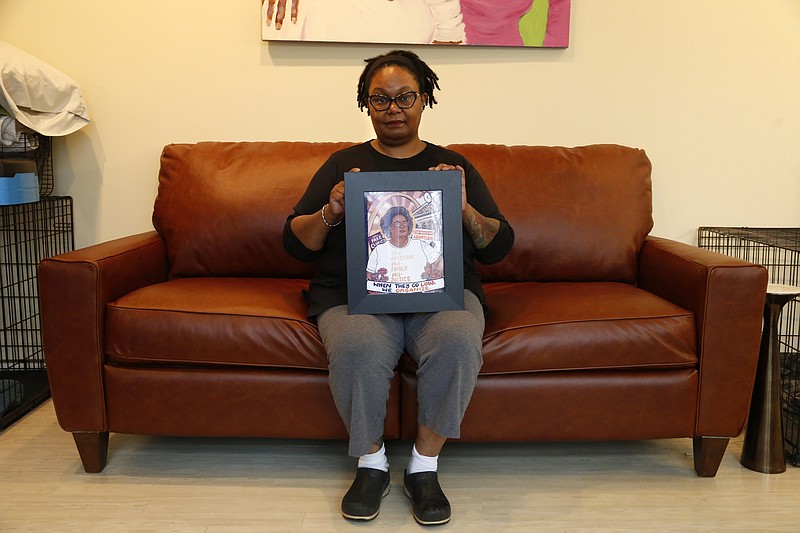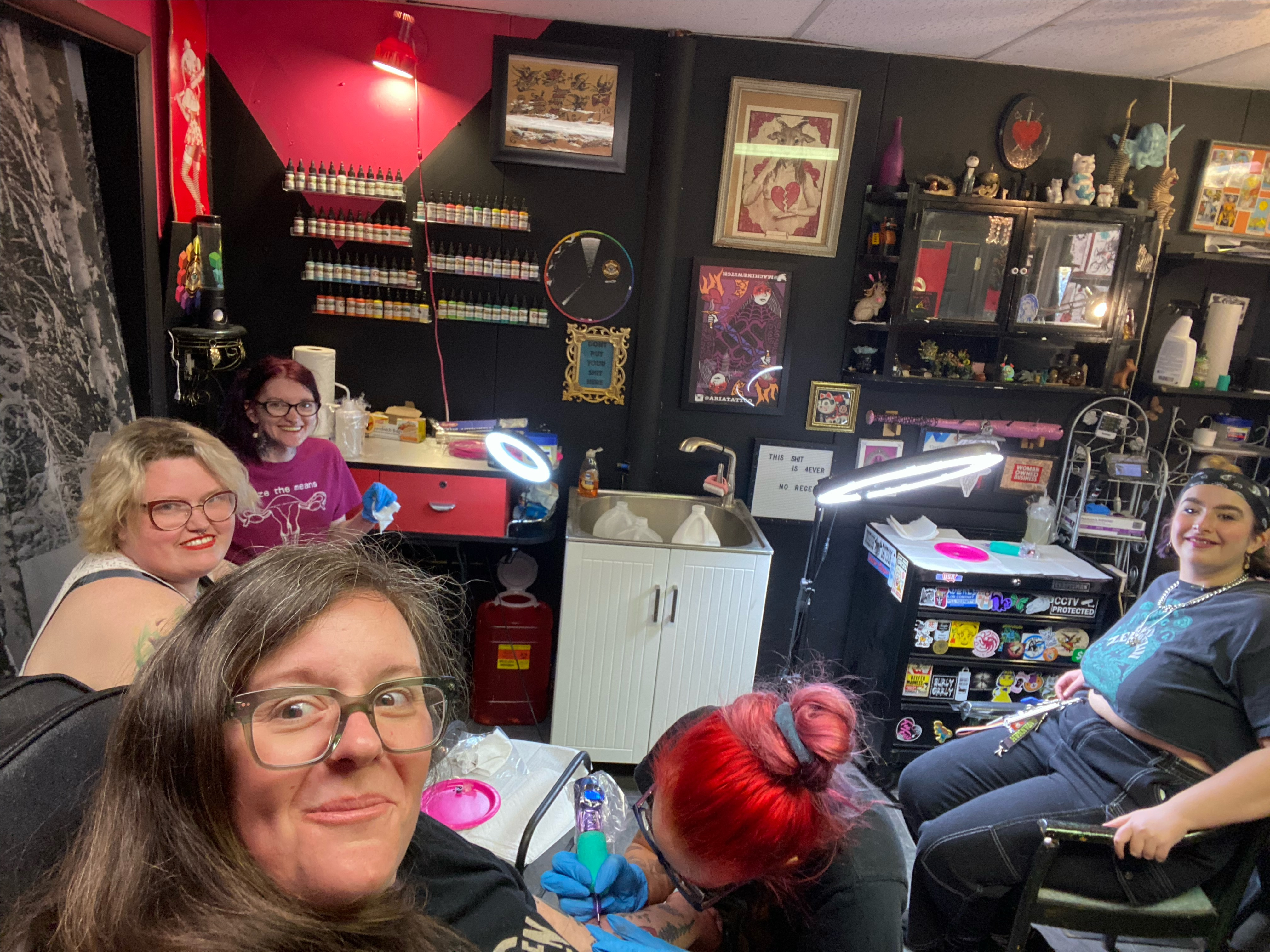The day's first caller begged for help to cross state lines and end her pregnancy.
"Please," the woman from Texas said in her voicemail. "Anything would be greatly appreciated."
Three states away, in southern Illinois, Alison Dreith heard the plea and felt shaky. For the first time, she would have to tell a caller "No."
"It's starting," Dreith said. "What we've been worrying about for years."
She works for the Midwest Action Coalition, one of almost 100 grassroots groups organizing as a safety valve for the vast swaths of the South and Midwest where abortion may soon be barred. When desperate people can't obtain abortions near home -- when they need plane tickets, bus fare, babysitters -- they reach out to groups like this one. As the U.S. Supreme Court is expected to gut Roe v. Wade, state after state has tightened restrictions, already pushing pregnant people further from home, for some hundreds of miles away.
Most manning these helplines are longtime abortion rights activists. Helpless to prevent the coming crisis, their goal now is to assist abortion seekers one by one, either legally by helping them travel, or illegally if that's what it eventually comes down to.
Dreith helms this resistance movement from the sofa on her rural pygmy goat farm, an unlikely headquarters for the gateway to abortion access. Nearby, a billboard greets people driving across the border into her state: "Welcome to Illinois, where you can get a safe, legal abortion" -- now bracing to be a likely destination for thousands seeking to end unwanted pregnancies.
But the Midwest Access Coalition's hotline is swamped and it's about to get much busier: If Roe is overturned, abortion is expected to be banned in more than half of American states.
The coalition, funded by donations and grants, will have to make hard choices. They stopped funding partners traveling with adult patients. They're considering capping the amount of money per client, and the number of clients per month.
Texas is outside the coalition's coverage area, but it offered to help when the state banned abortion after six weeks. But now it is routing Texas callers to other groups, which are also stressed.
As she apologized to the Texas caller for being unable to help, the coming reality suddenly seemed very real: In a post-Roe America, no matter how hard they try, some will be left behind.
She took a break from the phones to visit with her friend, Pamela Merritt, who had come to visit.
They spent decades in the trenches fighting what Dreith calls the "abortion wars" together. They were some of the most outspoken activists in Missouri, a state with among the nation's strictest abortion laws. Dreith led NARAL Pro-Choice Missouri and was on television so much she couldn't go to the grocery store without someone stopping her to talk about abortion.
Merritt started an unabashedly loud and liberal advocacy organization, Reproaction.
"Nobody is going to convince me that Black and brown people aren't going to be policed to within an inch of our lives for our pregnancy outcomes, that this won't be weaponized against us," said Merritt, who is Black.
A week earlier, a woman had been arrested in Texas after seeking care at a hospital, where staff suspected she'd self-administered an abortion, and called the sheriff. The charges against her were later dropped, but not until her name and mug shot had whipped around the world
"What we're going to pull together is going to be good," said Merritt, now the executive director of Medical Students for Choice. "It will not be enough."
On the day Dreith had to turn away the Texas caller, she booked a hotel room for a 22-year-old from Tennessee who was traveling 250 miles to the Hope Clinic. A restaurant server who makes $2.13 an hour called from Kentucky to beg for help with a babysitter, hotel and food.
She started this job with the Midwest Access Coalition in November.
She sometimes picks clients up at the airport to drive them to the Hope Clinic for Women in Granite City, Illinois, a half hour from her farm that already sees up to 7,000 patients each year and it now preparing for an influx from half the country.
Twenty minutes away, a Planned Parenthood opened a first-of-its-kind support desk called the Regional Logistics Center, in suburban Fairview Heights. It functions as a sort of travel agency for abortion seekers.
Merritt has heard people say that there is no abortion resistance, because they don't see this. It's not a march or a rally. It is this group of friends and colleagues organizing, usually quietly, from their living rooms and cars and cubicles.
The Midwest Action Coalition's client are often among the most vulnerable, those who've never flown on a plane before, who have no phone, no car, no credit card to book hotel rooms. She doesn't ask questions about what brought them to this point, she said, but many offer explanations anyway: homelessness, domestic violence, fetal abnormalities during pregnancies that were very much wanted.
"Your heart just breaks for people," Dreith said.
Isolated on the farm, she felt like she was living in a bubble, unable to process that in a matter of weeks the Supreme Court might ravage her life's work. She'd felt guilty for not being more outraged.
But reality was starting to wash over her. When the draft Supreme Court opinion was leaked, Dreith cried for five days straight, and then felt a deep resolve to finish her mission.
Conservative politicians are now specifically targeting people like her. Lawmakers in some states, including nearby Missouri, are attempting to make it illegal to "aid and abet" abortions out of state, even driving people across a bridge into Illinois.
People have always tried to end unwanted pregnancies, and they always will, she said. After all these years, she sees it as her responsibility to help them do that as safely as possible, regardless of the law.
So she talked with her husband, her lawyer and her friends.
"There will be a price," Dreith said.
She told them she is willing to pay it.
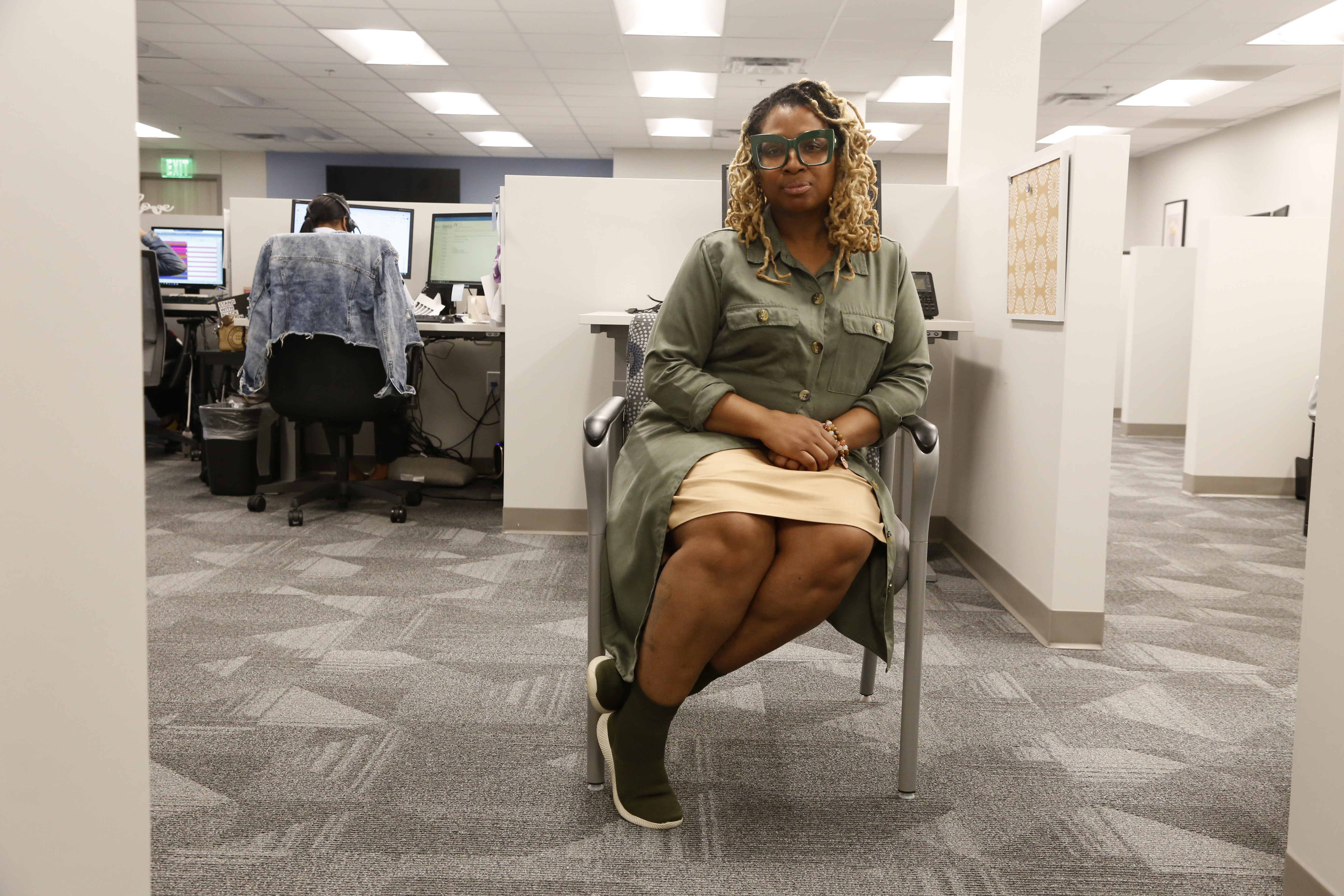 Kawanna Shannon, director of patient access at Planned Parenthood of the St. Louis Region and Southwest Missouri, sits in a call center at the Planned Parenthood clinic in Fairview Heights, Ill., on Monday, April 11, 2022. The clinic is among those in Illinois that is seeing more requests for abortion services from women from states where abortions are being restricted. "People are coming (from) as close as St. Louis, who may not have all their money. And as far as Louisiana," Shannon says. "It is requiring us to work longer hours …. But we understand the goal, right? And we're all 100% into the goal." (AP Photo/Martha Irvine)
Kawanna Shannon, director of patient access at Planned Parenthood of the St. Louis Region and Southwest Missouri, sits in a call center at the Planned Parenthood clinic in Fairview Heights, Ill., on Monday, April 11, 2022. The clinic is among those in Illinois that is seeing more requests for abortion services from women from states where abortions are being restricted. "People are coming (from) as close as St. Louis, who may not have all their money. And as far as Louisiana," Shannon says. "It is requiring us to work longer hours …. But we understand the goal, right? And we're all 100% into the goal." (AP Photo/Martha Irvine)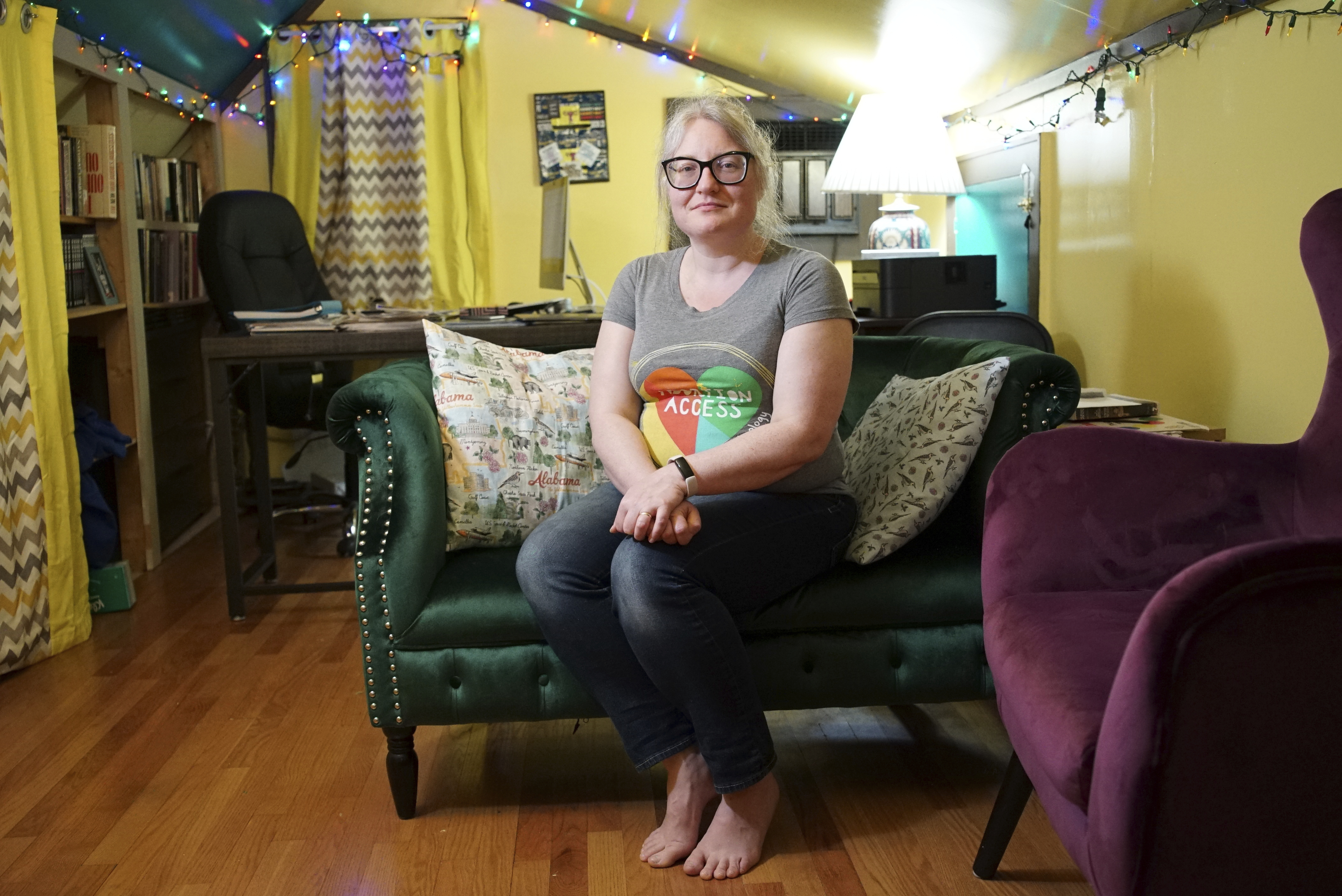 Robin Marty poses for a portrait at her home in Alabama on Monday, March 14, 2022. Marty runs the West Alabama Women's Center, which provides abortions, and is also author of a 247-page manual titled "The Handbook for a Post-Roe America." When the draft Supreme Court opinion on Roe v. Wade was leaked, her book sold out overnight. “Everybody wants something to do. ... I think people want to feel like there’s something within their control.” Marty had been a journalist. But she saw abortion access collapsing, felt constrained by the journalistic mandate of impartiality, and so she left the business to work on the front lines. (AP Photo/Allen G. Breed)
Robin Marty poses for a portrait at her home in Alabama on Monday, March 14, 2022. Marty runs the West Alabama Women's Center, which provides abortions, and is also author of a 247-page manual titled "The Handbook for a Post-Roe America." When the draft Supreme Court opinion on Roe v. Wade was leaked, her book sold out overnight. “Everybody wants something to do. ... I think people want to feel like there’s something within their control.” Marty had been a journalist. But she saw abortion access collapsing, felt constrained by the journalistic mandate of impartiality, and so she left the business to work on the front lines. (AP Photo/Allen G. Breed)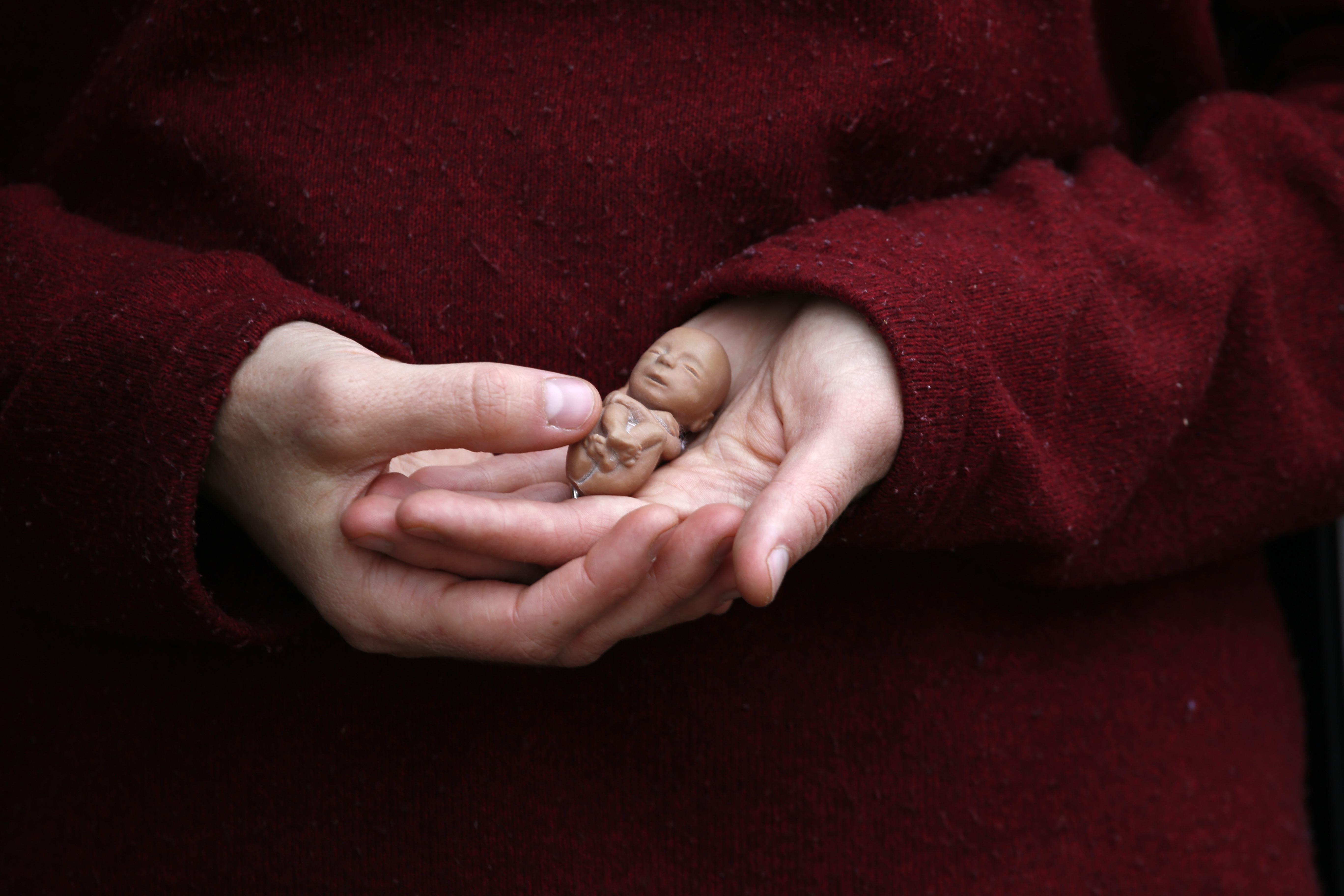 Melanie Wong holds a plastic fetus on Tuesday, April 12, 2022, outside the Hope Clinic for Women in Granite City, Ill. Wong, who opposes abortion, says she was standing outside the clinic to offer support to women seeking abortions who may have a change of heart and need support. Pregnant with her third child, she told her young son, "This is about how big my baby is." (AP Photo/Martha Irvine)
Melanie Wong holds a plastic fetus on Tuesday, April 12, 2022, outside the Hope Clinic for Women in Granite City, Ill. Wong, who opposes abortion, says she was standing outside the clinic to offer support to women seeking abortions who may have a change of heart and need support. Pregnant with her third child, she told her young son, "This is about how big my baby is." (AP Photo/Martha Irvine)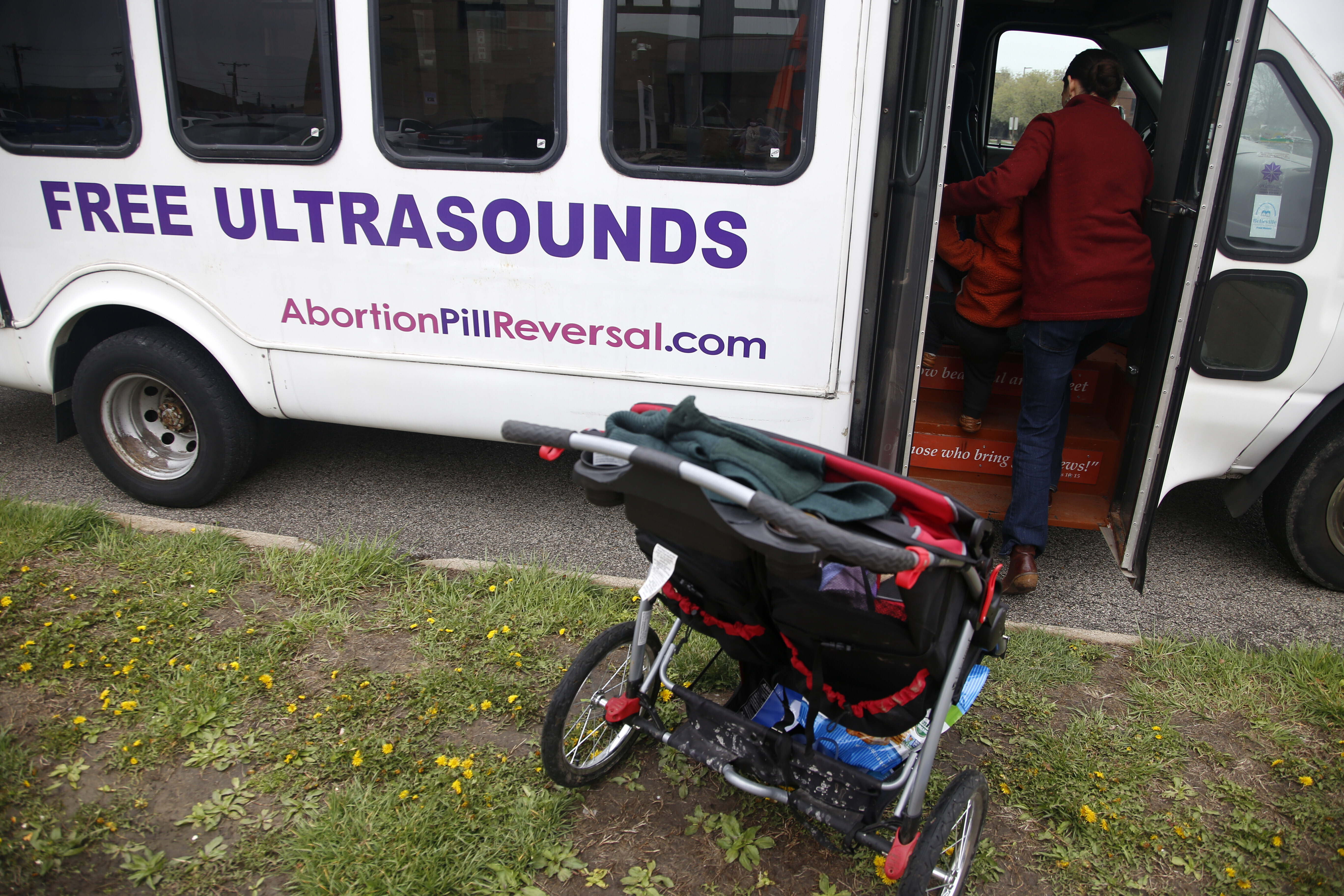 Melanie Wong walks her young son into an ultrasound van on Tuesday, April 12, 2022, outside the Hope Clinic for Women in Granite City, Ill. Wong sometimes comes to stand with other abortion opponents outside the clinic. The van belongs to another abortion opponent who offers ultrasounds to women who've come to the clinic for abortions. The hope is that seeing the ultrasound will persuade them not to have an abortion. (AP Photo/Martha Irvine)
Melanie Wong walks her young son into an ultrasound van on Tuesday, April 12, 2022, outside the Hope Clinic for Women in Granite City, Ill. Wong sometimes comes to stand with other abortion opponents outside the clinic. The van belongs to another abortion opponent who offers ultrasounds to women who've come to the clinic for abortions. The hope is that seeing the ultrasound will persuade them not to have an abortion. (AP Photo/Martha Irvine)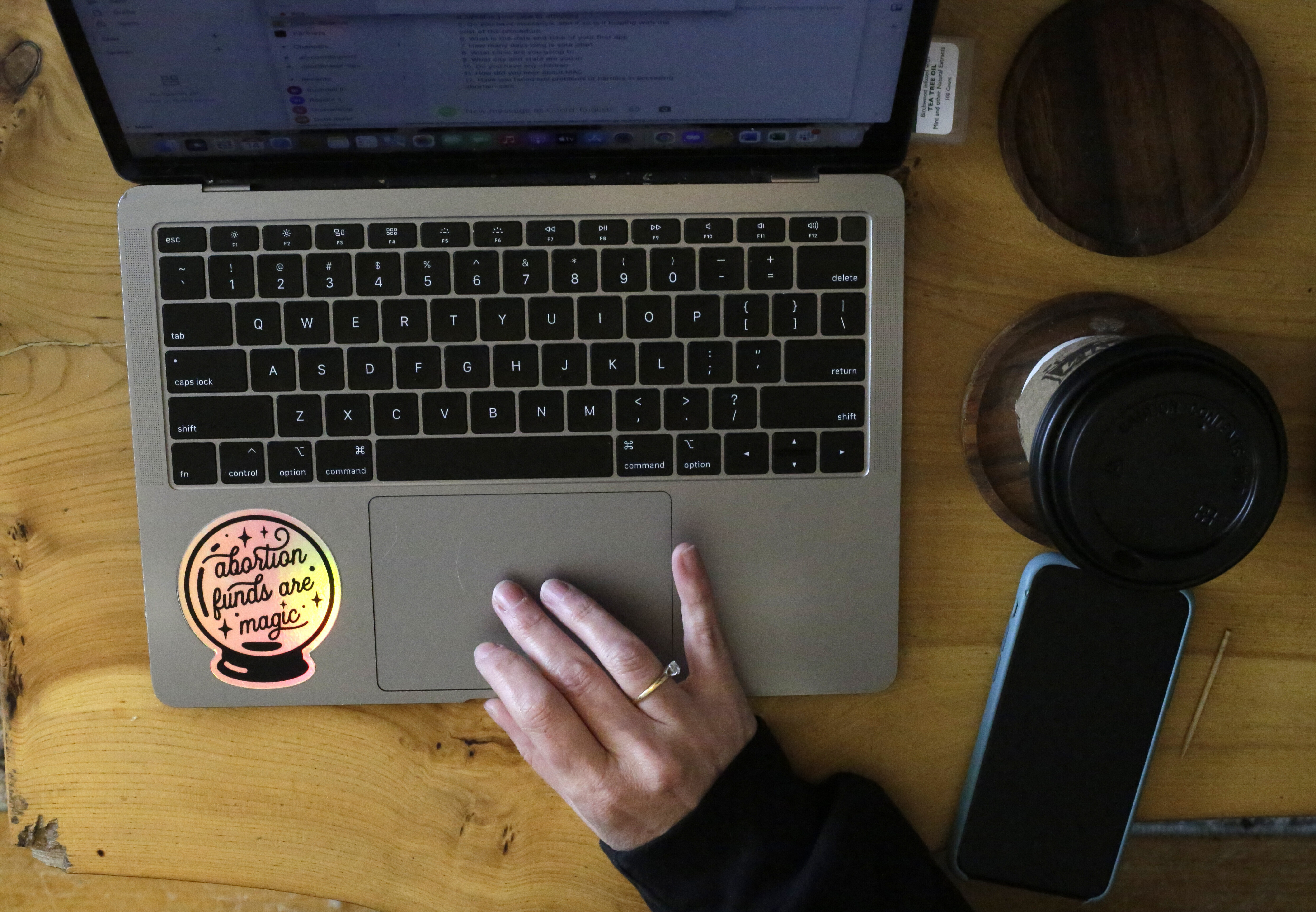 Alison Dreith works on her computer on Thursday, April 14, 2022, in her home in southern Illinois. Dreith works for the Midwest Access Coalition, which pays for "practical support" for women seeking abortions. That includes things like air fare, gas money, hotel rooms or child care. "It is a part of the work that fills you back up — when you're helping someone else," Dreith says. (AP Photo/Martha Irvine)
Alison Dreith works on her computer on Thursday, April 14, 2022, in her home in southern Illinois. Dreith works for the Midwest Access Coalition, which pays for "practical support" for women seeking abortions. That includes things like air fare, gas money, hotel rooms or child care. "It is a part of the work that fills you back up — when you're helping someone else," Dreith says. (AP Photo/Martha Irvine)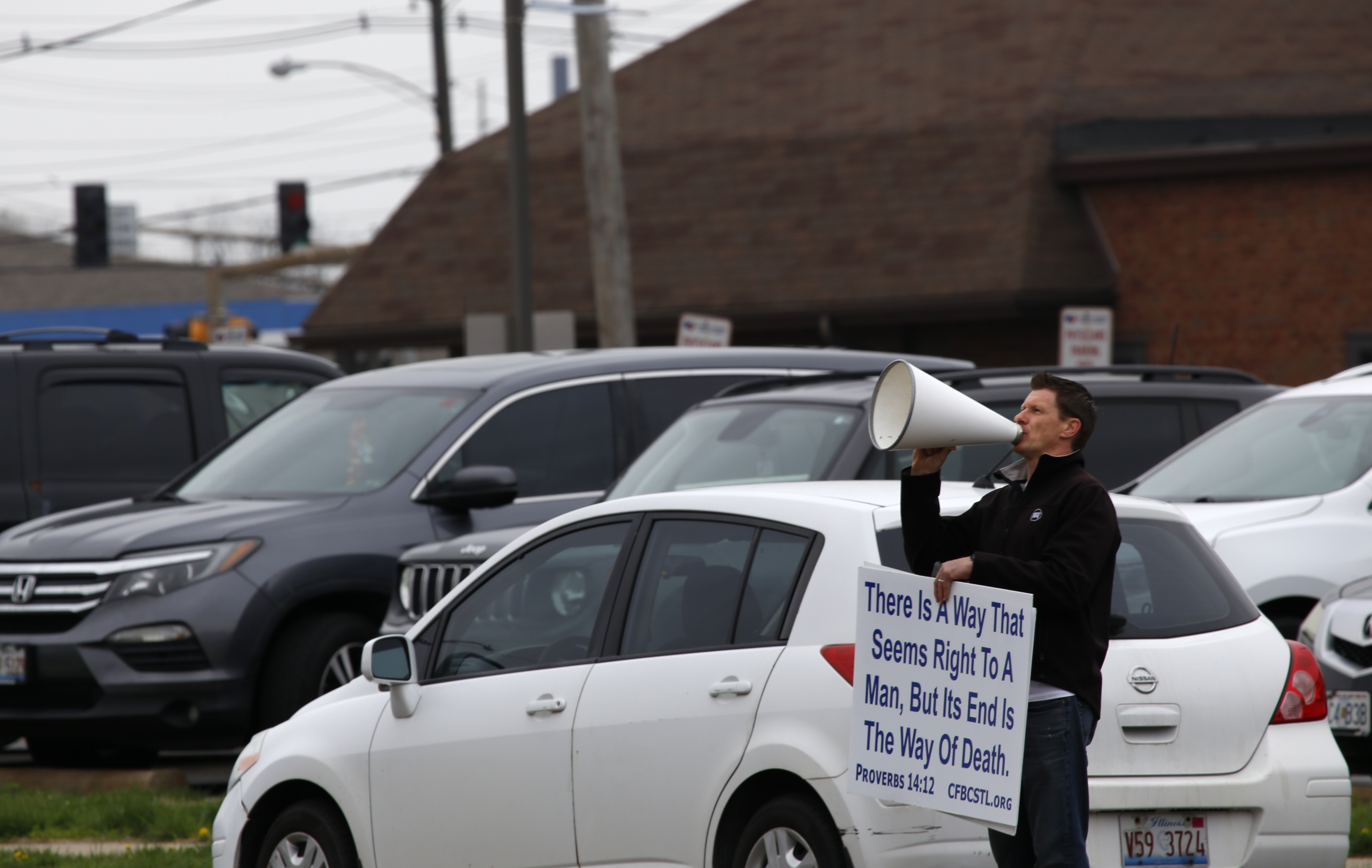 A pastor uses a megaphone to implore women not to get abortions on Tuesday, April 12, 2022, outside the Hope Clinic for Women in Granite City, Ill. "Don't murder your baby!" he shouted. The pastor, whose church is across the state line in the St. Louis area, declined to give his name but said he stands outside the clinic and does this often. More women from Missouri and states much farther away are coming to Illinois for abortions, as more states restrict that kind of care. (AP Photo/Martha Irvine)
A pastor uses a megaphone to implore women not to get abortions on Tuesday, April 12, 2022, outside the Hope Clinic for Women in Granite City, Ill. "Don't murder your baby!" he shouted. The pastor, whose church is across the state line in the St. Louis area, declined to give his name but said he stands outside the clinic and does this often. More women from Missouri and states much farther away are coming to Illinois for abortions, as more states restrict that kind of care. (AP Photo/Martha Irvine)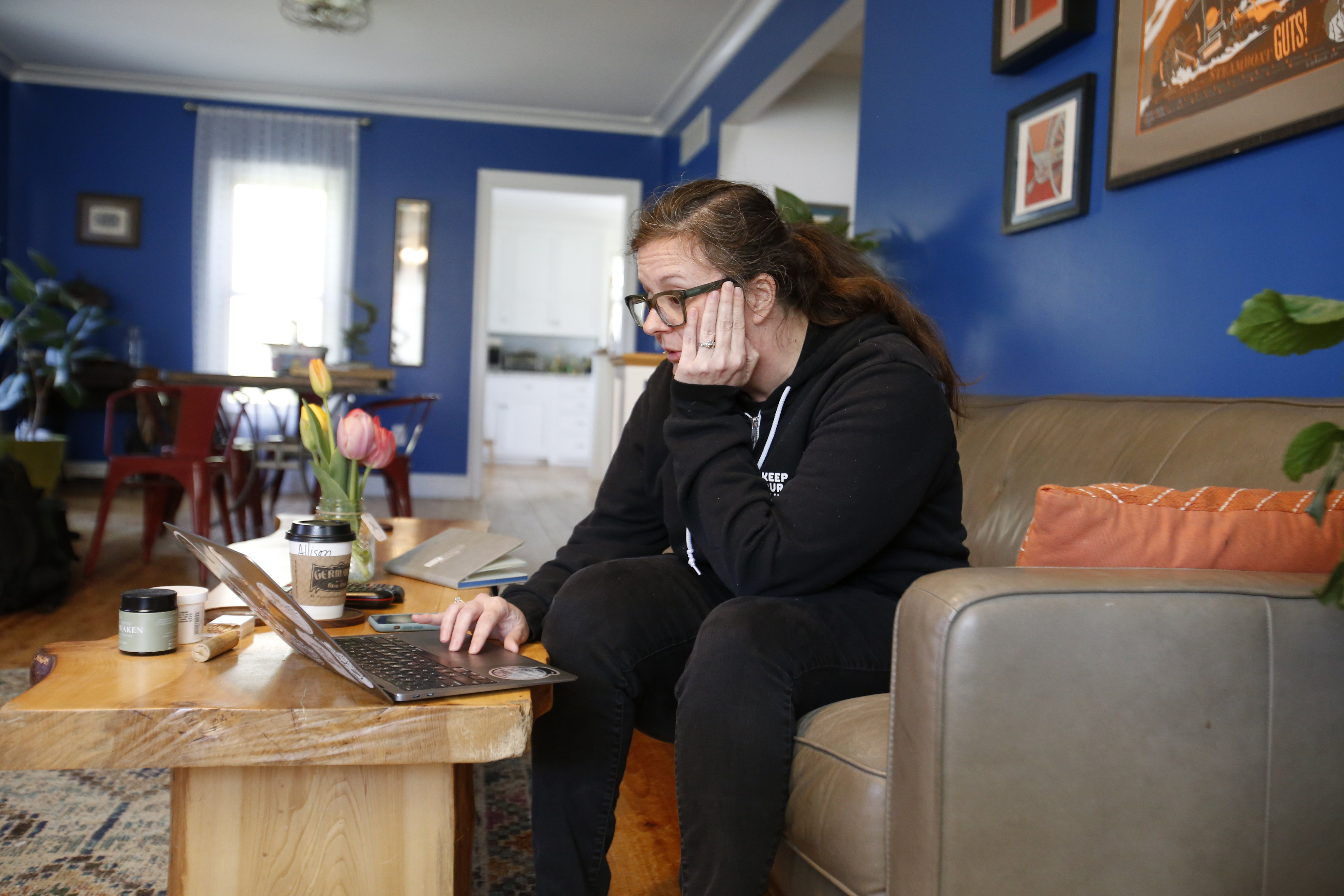 Alison Dreith puts her head in her hand as she realizes she has to turn away a client from Texas, while working from home on Thursday, April 14, 2022, in southern Illinois. Dreith works remotely for the Midwest Access Coalition, which pays for "practical support" for women seeking abortions. That includes things like air fare, gas money, hotel rooms or child care. High demand from women in Texas, which has restricted abortion, has caused MAC to have to send those clients to other support organizations. "It's sad," she says. "It just breaks your heart when you feel like you're the ones set up to take care of them and then you can't…. We need help." (AP Photo/Martha Irvine)
Alison Dreith puts her head in her hand as she realizes she has to turn away a client from Texas, while working from home on Thursday, April 14, 2022, in southern Illinois. Dreith works remotely for the Midwest Access Coalition, which pays for "practical support" for women seeking abortions. That includes things like air fare, gas money, hotel rooms or child care. High demand from women in Texas, which has restricted abortion, has caused MAC to have to send those clients to other support organizations. "It's sad," she says. "It just breaks your heart when you feel like you're the ones set up to take care of them and then you can't…. We need help." (AP Photo/Martha Irvine)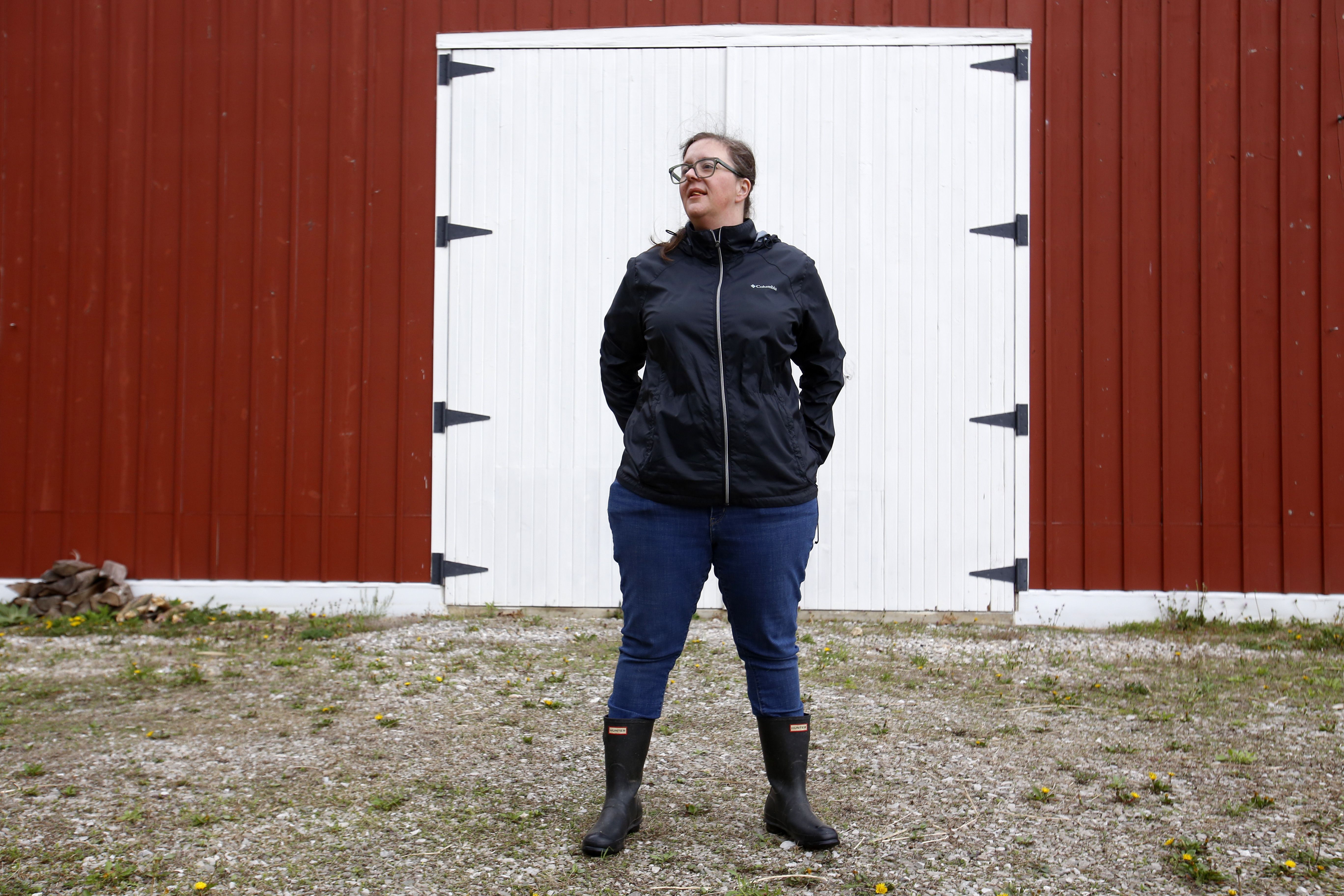 Alison Dreith stands in front of her barn in southern Illinois on Wednesday, April 13, 2022. Dreith works remotely for the Midwest Access Coalition, which pays for "practical support" for women seeking abortions. That includes things like air fare, gas money, hotel rooms or child care. Says Dreith, "I'm kind of a freak out first, calm down later kind of person is the big energy I have. So I really appreciate that I have something — no pun intended — like, really practical to do." (AP Photo/Martha Irvine)
Alison Dreith stands in front of her barn in southern Illinois on Wednesday, April 13, 2022. Dreith works remotely for the Midwest Access Coalition, which pays for "practical support" for women seeking abortions. That includes things like air fare, gas money, hotel rooms or child care. Says Dreith, "I'm kind of a freak out first, calm down later kind of person is the big energy I have. So I really appreciate that I have something — no pun intended — like, really practical to do." (AP Photo/Martha Irvine)
